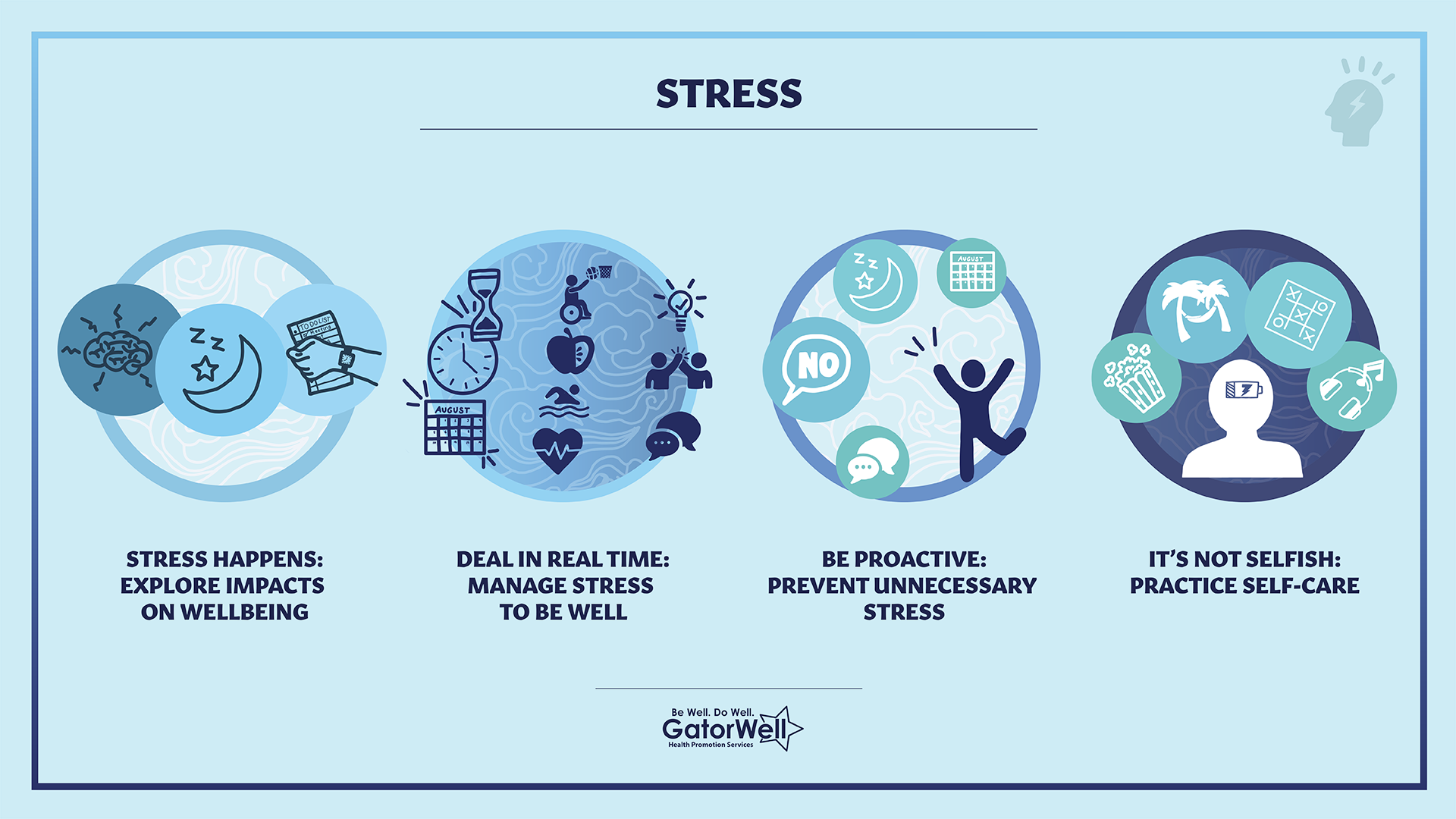STRESS MANAGEMENT

We all have things in our lives that have the potential to create stress for us. To help us understand the causes, let's consider the root of our stress – what is the reason for the stress? Once we have this knowledge, we can more effectively address stress and reach out to resources that are the most appropriate to help us understand, reduce and ideally prevent stress in our lives.
There is no one thing that is “guaranteed” to help everyone reduce their stress BUT there are some things that, based on research, are likely to have an impact on stress like physical activity, getting good sleep and practicing mindfulness.
STRESS HAPPENS: EXPLORE ITS IMPACT ON WELL-BEING
Stress can impact many aspects of our lives and our wellness. It can be helpful to consider how stress impacts wellbeing for you. It can also be helpful to see how working on your well-being can have a positive impact on stress. If we are fueling our bodies well, getting active, prioritizing sleep, managing our time well, overcoming procrastination, maintaining social connection, etc., most likely our well-being will improve, and our stress will be positively impacted.
Key Question:
How is stress impacting other areas of your well-being?
DEAL IN REAL TIME: MANAGE STRESS TO BE WELL
Stress is a reality in life. How we understand and address stress though is up to the individual. We have different signs of stress and different ways to cope with stress when it occurs. Identifying what works well for us to cope with stress in healthy ways is important. It could be practicing a mindfulness strategy, taking a nap (under 30 mins, before 5pm), talking/venting to someone, crying, focusing on what you can learn/how you can grow from the situation, etc.
Key Questions:
How could you remember what you know helps you cope with stress when it occurs? OR if you’re not sure what helps you, what’s your first step in exploring what could help you cope with stress?
BE PROACTIVE: PREVENT UNNECESSARY STRESS
It may be surprising, but we can prevent stress in our lives. We can do this by considering where our stress is coming from and drilling down to the root cause. From there we can work on implementing strategies in our lives which can prevent or reduce stress like managing our time in ways that work for us, overcoming procrastination, moving our bodies, getting good sleep (quantity and quality), saying no/setting boundaries, staying connected with family and friends, etc.
Key Questions:
What is a way you can work on preventing stress in your life? What strategy might work for you to prevent stress?
IT’S NOT SELFISH: PRACTICE SELF-CARE AND SELF COMPASSION
Self-care and self-compassion can take time and can take resources. Sometimes it can feel selfish dedicating time to self-care and self-compassion when you have so much else that you need to do. It can be helpful to remember that self-care is very individualized and doesn’t have to take a lot of time. Maybe it’s taking 15 minutes to do a sudoku puzzle, maybe it’s a 30 min call with someone that cares about you, maybe it’s a five-minute walk around the block. Overall, practicing self-care and self-compassion is when you do something that reenergizes, rejuvenates, and replenishes you so you can tackle whatever is next. Sometimes the barrier can be giving ourselves permission to practice self-care and self-compassion.
Key Question:
What could it look like when you give yourself permission to practice self-care?
It can also be helpful to consider Community Care. This concept shows the importance of building and utilizing community in addressing stress and trials in life. Who do you have in your community? How can you continue to build your community and be sure to reciprocate support and encouragement?
Key Question:
How would you like to build on or create a stronger community of support?
